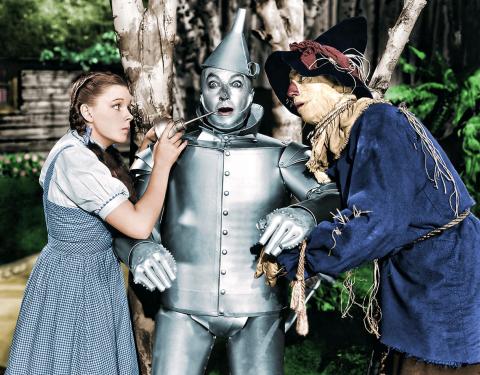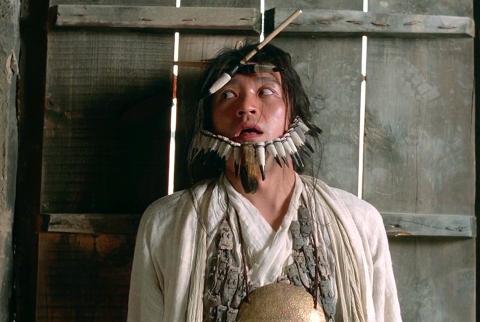Clapping, shouting out and singing along are usually frowned upon at art-house film festivals — but not at the Golden Horse Fantastic Film Festival (金馬奇幻影展). Celebrating its second edition this year, the extension of the Taipei Golden Horse Film Festival (台北金馬影展) embraces B movies, cult films and genre flicks in an attempt to “change the way people watch movies” and “emancipate audiences from the orthodox festival experience,” according to festival director Wen Tien-hsiang (聞天祥).
Highlights include early, low-budget flicks by several Hollywood directors. For horror fans, Sam Raimi’s hilarious and gory Evil Dead trilogy achieved an exalted cult status long before his Spider-Man blockbusters. Legend has it that Robert Rodriguez, the Hollywood player behind Once Upon a Time in Mexico and Sin City, raised US$7,000 by participating in clinical drug trials for his directorial debut, El Mariachi (1992). The action film follows a traveling mariachi who is mistaken for a cold-blooded killer. Then only 23 years old, Rodriguez used an amateur cast and scripted, shot, directed, edited and produced the movie himself.
The Rocky Horror Picture Show is all about audience participation, and the classic returns with two sold-out screenings after last year’s ruckus, which saw a full-house audience encouraged to perform, dance and use props such as rice, newspaper and leather gloves. Those inspired to sing along during the screenings of The Wizard of Oz are also welcome to do so, Wen says.

Photo Courtesy of Golden Horse Fantastic Film Festival
Stephen Chow’s (周星馳) diptych, A Chinese Odyssey (齊天大聖西遊記/東遊記), demonstrates the organizer’s willingness to seek out cult movies rooted in Asian culture rather those transplanted from the West. With a large fan base and frequent broadcasting on television, Chow’s comedies have “great potential to become cult classics,” Wen said.
Japanese gonzo gore cinema addicts can get their fix with Helldriver. Drenched in blood and boasting bizarre artificial body devices, the zombie epic by Yoshihiro Nishimura, a master of the splatter genre, tells of teenager Kika’s crusade to destroy her evil mother, who rules over the undead in a zombie-ridden Japan.
Unable to completely shake off the more artistic temperament it inherited from the Golden Horse, the young spin-off’s lineup is dotted with art-house items. Among them, If the See Doesn’t Die is a sober allegory on the modern history of the Balkan states told through a tale of fatherly devotion.

Photo Courtesy of Golden Horse Fantastic Film Festival
Wen said the fledgling festival has successfully landed a permanent spot in Golden Horse’s stable of events thanks to its instant popularity and strong ticket sales. Wen’s small team has already begun working on the next edition which, if everything goes to plan, will include a retrospective on American director and cult figure John Waters, known for his early campy Trash Trilogy and cult films such as Hairspray and Cry-Baby.
“No doubt we can do a lot of even crazier things with [Waters’] films. For example, we can let cross-dressers who weigh over 100kg watch the movies for free,” said Wen, referring to Divine, a full-figured, flamboyant drag queen who was made into an underground star by the director’s cult classics.

Photo Courtesy of Golden Horse Fantastic Film Festival

Photo Courtesy of Golden Horse Fantastic Film Festival

Photo Courtesy of Golden Horse Fantastic Film Festival

In the March 9 edition of the Taipei Times a piece by Ninon Godefroy ran with the headine “The quiet, gentle rhythm of Taiwan.” It started with the line “Taiwan is a small, humble place. There is no Eiffel Tower, no pyramids — no singular attraction that draws the world’s attention.” I laughed out loud at that. This was out of no disrespect for the author or the piece, which made some interesting analogies and good points about how both Din Tai Fung’s and Taiwan Semiconductor Manufacturing Co’s (TSMC, 台積電) meticulous attention to detail and quality are not quite up to

April 21 to April 27 Hsieh Er’s (謝娥) political fortunes were rising fast after she got out of jail and joined the Chinese Nationalist Party (KMT) in December 1945. Not only did she hold key positions in various committees, she was elected the only woman on the Taipei City Council and headed to Nanjing in 1946 as the sole Taiwanese female representative to the National Constituent Assembly. With the support of first lady Soong May-ling (宋美齡), she started the Taipei Women’s Association and Taiwan Provincial Women’s Association, where she

It is one of the more remarkable facts of Taiwan history that it was never occupied or claimed by any of the numerous kingdoms of southern China — Han or otherwise — that lay just across the water from it. None of their brilliant ministers ever discovered that Taiwan was a “core interest” of the state whose annexation was “inevitable.” As Paul Kua notes in an excellent monograph laying out how the Portuguese gave Taiwan the name “Formosa,” the first Europeans to express an interest in occupying Taiwan were the Spanish. Tonio Andrade in his seminal work, How Taiwan Became Chinese,

Mongolian influencer Anudari Daarya looks effortlessly glamorous and carefree in her social media posts — but the classically trained pianist’s road to acceptance as a transgender artist has been anything but easy. She is one of a growing number of Mongolian LGBTQ youth challenging stereotypes and fighting for acceptance through media representation in the socially conservative country. LGBTQ Mongolians often hide their identities from their employers and colleagues for fear of discrimination, with a survey by the non-profit LGBT Centre Mongolia showing that only 20 percent of people felt comfortable coming out at work. Daarya, 25, said she has faced discrimination since she